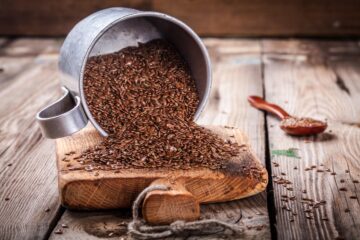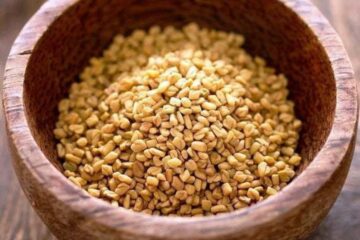Name:
The herb we are discussing is commonly known as Ginkgo Biloba. Its scientific name is also Ginkgo Biloba, placing it in the Ginkgo genus and the Biloba species.
Description:
Ginkgo Biloba is a large, deciduous tree that can grow up to 35 meters tall. Its leaves are fan-shaped, typically split in the middle, and range in color from a light green in the spring to a vibrant golden yellow in the fall. The tree produces an inedible fruit that emits an unpleasant smell.
Medicinal Uses of Ginkgo Biloba:
- Cognitive Function and Alzheimer’s Disease: The Ginkgo leaf extract is commonly used to improve memory and cognitive abilities, and has been extensively studied for its potential benefits in Alzheimer’s disease. A study published in the Journal of the American Medical Association (https://jamanetwork.com/journals/jama/fullarticle/188453), involving over 3000 participants over 75 years of age, found that ginkgo did not reduce the overall incidence rate of dementia or Alzheimer’s disease. However, other research suggests ginkgo may slightly improve cognitive function in individuals with Alzheimer’s disease or mild cognitive impairment, indicating a possible benefit for early stages of cognitive decline.
- Peripheral Arterial Disease: Ginkgo Biloba is often used to treat peripheral arterial disease (PAD), a condition that restricts blood flow to the limbs usually due to a buildup of plaque in the arteries. An analysis by the Cochrane Database of Systematic Reviews (https://www.cochranelibrary.com/cdsr/doi/10.1002/14651858.CD006888.pub2/full) concluded that Ginkgo Biloba can increase the distance a person with PAD can walk without pain, indicating an improvement in blood flow.
- Tinnitus: Tinnitus, a condition characterized by a persistent ringing in the ears, is another area where Ginkgo Biloba has been researched. However, evidence on its efficacy for this condition is mixed. A review published by the American Academy of Family Physicians (https://www.aafp.org/afp/2011/0901/p527.html) suggested that ginkgo may have a modest effect for tinnitus, but more research is needed to confirm these findings.
- Age-Related Macular Degeneration: Ginkgo Biloba has also been studied for its potential to slow the progression of age-related macular degeneration (AMD), a leading cause of vision loss in older adults. The Age-Related Eye Disease Study Research Group (https://www.nei.nih.gov/learn-about-eye-health/resources-for-health-educators/eye-health-data-and-statistics/age-related-eye-disease-study-areds) found that dietary supplements including Ginkgo Biloba can help reduce the risk of AMD progression.
- Anxiety and Depression: Ginkgo Biloba has been used traditionally to alleviate symptoms of anxiety and depression. A study by the Phytotherapy Research journal (https://onlinelibrary.wiley.com/doi/full/10.1002/ptr.1653) found that participants with generalized anxiety disorder and adjustment disorder showed a significant reduction in their symptoms when treated with Ginkgo Biloba extract, compared to a placebo. However, more extensive clinical trials are required to confirm these findings and fully understand the implications.
- Asthma and Tinnitus: Historically, Ginkgo Biloba has been used to alleviate symptoms of asthma and tinnitus (ringing in the ears). While there have been some promising animal studies suggesting that Ginkgo Biloba could help reduce inflammation in the lungs and improve breathing, human data is still lacking. As per the National Center for Complementary and Integrative Health (https://www.nccih.nih.gov/health/ginkgo), more research is needed to evaluate these effects in people.
- Migraines: There is some preliminary evidence to suggest that Ginkgo Biloba might be beneficial for migraines. A study published in the journal Neurological Sciences (https://link.springer.com/article/10.1007/s10072-019-03870-0) found that supplementation with Ginkgo Biloba was associated with a reduction in the frequency, duration, and severity of migraines. Again, more research is needed to confirm these findings and to understand the underlying mechanism better.
- Premenstrual Syndrome (PMS): Ginkgo Biloba might also have a role in managing symptoms of premenstrual syndrome (PMS). A review by the Faculty of Pharmacy at the Tehran University of Medical Sciences (https://sites.kowsarpub.com/semj/articles/17540.html) indicated that supplementation with Ginkgo Biloba could reduce PMS symptoms, but more high-quality clinical trials are needed to confirm these effects.
Origin and Distribution:
The Ginkgo Biloba tree is native to China. It has a long history dating back to almost 270 million years, making it one of the oldest tree species in the world. Today, it is widely cultivated worldwide, especially in urban environments, due to its ability to resist disease and pollution.
Cultivation and Care:
Ginkgo Biloba trees prefer sandy, well-drained soil, and full sun. They can tolerate a variety of environmental conditions, making them highly adaptable. They are not usually prone to diseases or pests, but young trees might need protection from harsh winds.
Harvesting and Storage:
The leaves of the Ginkgo Biloba tree are harvested in the fall when they turn yellow. After harvesting, the leaves are dried in a cool, dry place away from direct sunlight and stored in an airtight container.
Uses:
Culinary Uses: Ginkgo Biloba seeds, when cooked, are used in traditional Asian cuisine, especially in desserts and special dishes.
Medicinal Uses: The leaves of the Ginkgo Biloba tree are used in herbal medicine. They are believed to have numerous health benefits, including improving cognitive function and blood circulation. A comprehensive review from the National Center for Complementary and Integrative Health (https://www.nccih.nih.gov/health/ginkgo) indicates that Ginkgo may be beneficial in managing symptoms related to dementia, although further research is needed to confirm these effects.
Other Uses: In addition to culinary and medicinal uses, Ginkgo Biloba is popular as an ornamental tree due to its distinctive fan-shaped leaves and vibrant fall color.
Safety Information:
While generally considered safe for most people, Ginkgo Biloba can cause side effects such as headaches, dizziness, heart palpitations, and digestive issues. It’s advised to consult with a healthcare provider before starting any new supplement regimen, as mentioned by Mayo Clinic (https://www.mayoclinic.org/drugs-supplements-ginkgo/art-20362032).
Historical and Cultural Significance:
Ginkgo Biloba holds significant cultural importance, especially in East Asia. It is a symbol of longevity and resilience. Additionally, it is often associated with Buddhism and is frequently found near temples.




